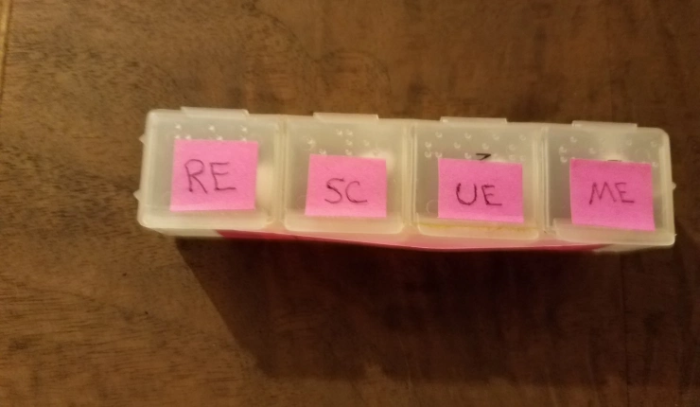Years ago, I started an antidepressant. I completed a six month trial period and it wasn’t right for me. I was hesitant to try a different one. Last summer, I felt guilty for sobbing at a joyous family event. My conditions affected me at work too. I excused myself from meetings because sadness, fatigue, self-doubt, and indecision suffocated me.
One day, I suddenly cried uncontrollably at my desk and nearly hyperventilated. My wonderful work team heard me and pushed my computer chair into an office. At that moment, we formed our own support group. We talked about things we looked forward to and what made us happy.
At the time, I was attending counseling appointments biweekly and alternating various coping activities. I spoke with my counselor and started to make weekly appointments. Also, I told my primary care doctor I was considering trying a new medication. I told her about my experience with the first medication and my concern about going through it again. She suggested I take a test to see what medications work for me. This test was fantastic! It was a painless cheek swab. Within a week, I had a list of medications that had the least, moderate and most significant gene interaction.
The next month, my best friend drove me to my intake appointment at the psychiatrist’s office. She even showed me a route that allowed me to avoid the traffic circle. I gave the personalized list of medications to the psychiatrist. Once we were done at the office, my BFF and I stopped for ice cream. I ordered a “Reese’s Treatza Pizza” and she ordered a “blizzard”. After a follow-up appointment, the psychiatrist prescribed medications that were likely to have the least amount of gene interaction.
Other than initial grogginess, I quickly adjusted to the new medication. After a couple months of taking a daily antidepressant and mood-stabilizing vitamin, I felt great. Coworkers, family and close friends told me they saw progress. That made me feel even better!
I learned it was acceptable to take these medications. This was life-changing. When my depression is under control, my anxiety is lower. When my anxiety is lower, I’m less likely to have a panic attack. Consequently, panic attacks aggravate my irregular heart rate.
It’s important to acknowledge that mental health is connected to physical health. In true moments of panic, I take my rescue pill. I used to feel weak and guilty when I took it. I realized it’s no different than needing a rescue inhaler. I wouldn’t feel guilty about having asthma. I shouldn’t feel guilty for my panic disorder. I even decorated the pillbox. I regularly use my coping tools and take my medication as prescribed. Now, I seldom need my rescue pill.
I’m thankful to have these medications working hard to treat me. I work hard to do the same.
If you’re starting a new medication, here are some tips.
- Write down the possible side effects.
- Keep a log of any side effects that you experience.
- Make an effort to take the medication at the same time each day.
- If you notice you’re feeling worse, act immediately. You don’t have to wait to address it at your follow-up appointment.
- Most importantly, stay hopeful that you’ll find medication(s) that works for you.
It can take some time, but you’ve probably taken a similar approach when making a big purchase. I hope this helps steer you away from the stigma that occasionally surrounds the treatment of mental health.
I wish you the best.

